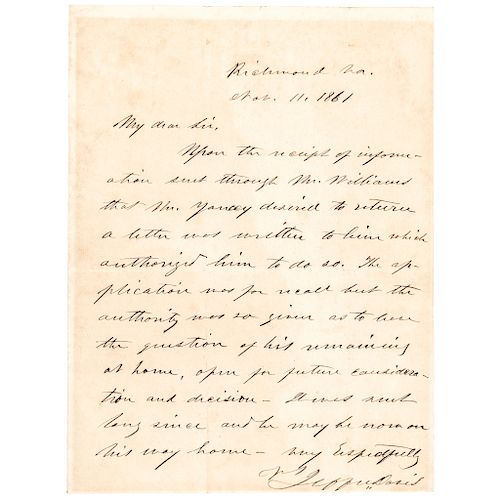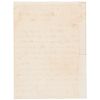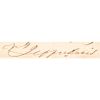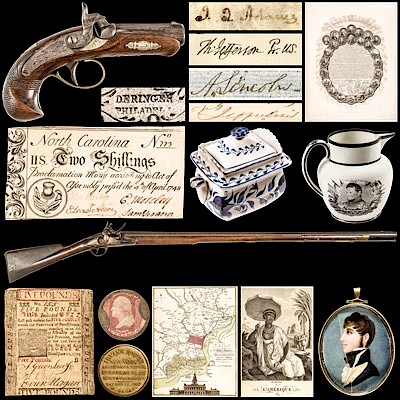1861 Provisional Confederate President JEFFERSON DAVIS Autograph Letter Signed
Lot 27
Categories
Estimate:
$8,000 - $10,000
Absentee vs Live bid
Two ways to bid:
- Leave a max absentee bid and the platform will bid on your behalf up to your maximum bid during the live auction.
- Bid live during the auction and your bids will be submitted real-time to the auctioneer.
Bid Increments
| Price | Bid Increment |
|---|---|
| $0 | $10 |
| $200 | $20 |
| $300 | $25 |
| $500 | $50 |
| $1,000 | $100 |
| $2,000 | $200 |
| $3,000 | $250 |
| $5,000 | $500 |
| $10,000 | $1,000 |
| $20,000 | $2,000 |
| $30,000 | $2,500 |
| $50,000 | $5,000 |
| $100,000 | $10,000 |
| $200,000 | $20,000 |
| $300,000 | $25,000 |
| $500,000 | $50,000 |
About Auction
By Early American History Auctions
Oct 19, 2019
Set Reminder
2019-10-19 12:00:00
2019-10-19 12:00:00
America/New_York
Bidsquare
Bidsquare : Historic Autographs-Currency-Political-Americana-Militaria-Guns
https://www.bidsquare.com/auctions/early-american-history-auctions/historic-autographs-currency-political-americana-militaria-guns-4513
326 Lots of Rare, Historic Autographs, Americana, Civil War Era, George Washington, Abraham Lincoln, Black History, Revolutionary War Era, Colonial America, Federal Period, War of 1812, Colonial Currency, Indian Peace Medals & more... Early American History Auctions auctions@earlyamerican.com
326 Lots of Rare, Historic Autographs, Americana, Civil War Era, George Washington, Abraham Lincoln, Black History, Revolutionary War Era, Colonial America, Federal Period, War of 1812, Colonial Currency, Indian Peace Medals & more... Early American History Auctions auctions@earlyamerican.com
- Lot Description
Autographs
Jefferson Davis Autograph Letter Signed Both as President & Confederate States of America President-Elect
JEFFERSON "JEFF" DAVIS (1808-1889). American Statesman, President and Leader of the Confederacy during the American Civil War, serving as the CSA President for its entire history.
November 11, 1861-Dated Civil War Period, historic with Important Content Autograph Letter Signed, "Jeffn Davis," as Provisional President of the Confederacy and President-elect of the Confederate States of America, 1 page, measuring 6.5" x 8.5", Richmond, VA., Very Fine. Well written, and easy to read in brown on period wove paper, light narrow white border trace at perimeter from a prior display. Extremely Rare. It reads, in full:
"Richmond, Va. -- Nov. 11, 1861. -- My dear Sir, --- Upon the receipt of information sent through Mr. [James] Williams that Mr. [William L.] Yancey desired to return, a letter was written to him which authorized him to do so. The application was for recall but the authority was so given as to leave the question of his remaining at home, open for future consideration and decision - It was sent long since and he may now be on his way home. Very respectfully, -- (Signed) Jeffn Davis."
During the Civil War, Confederate President Jefferson Davis dispatched Yancey to Europe on a mission to secure diplomatic recognition for the Confederacy; his efforts were unsuccessful. In 1862, he was elected to the Confederate Senate and served there until his death.
William Lowndes Yancey (1814-1863) was a journalist, politician, orator, diplomat and an American leader of the Southern secession movement. A member of the group known as the Fire-Eaters, Yancey was one of the most-effective agitators for Secession and rhetorical defenders of Slavery.
Yancey exceeded the views of many Southern partisans by calling for the resumption of the African Slave trade. In 1850, he opposed the compromise efforts of Henry Clay and called for Secession.
In 1860, Yancey attended the Democratic National Convention and worked to include Southern demands in the party platform. His efforts were opposed by the backers of Stephen A. Douglas, prompting a walkout by Yancey and other Southern delegates. He later attended the Southern Democratic Convention in Baltimore and worked on behalf of its candidate (see Election of 1860). Following Lincoln's triumph, Yancey drafted the Secession Ordinance for Alabama in January 1861.
- Shipping Info
-
Early American provides in-house worldwide shipping. Please contact us directly if you have questions about your specific shipping requirements.
-
- Buyer's Premium



 EUR
EUR CAD
CAD AUD
AUD GBP
GBP MXN
MXN HKD
HKD CNY
CNY MYR
MYR SEK
SEK SGD
SGD CHF
CHF THB
THB













